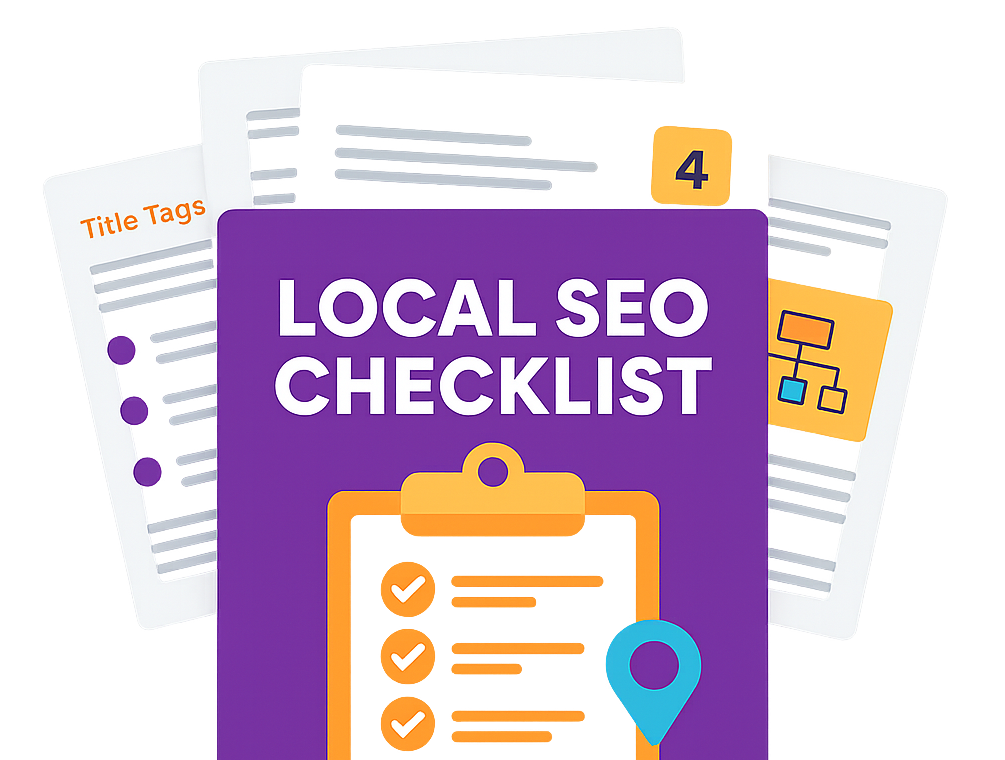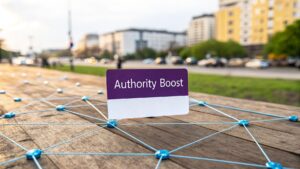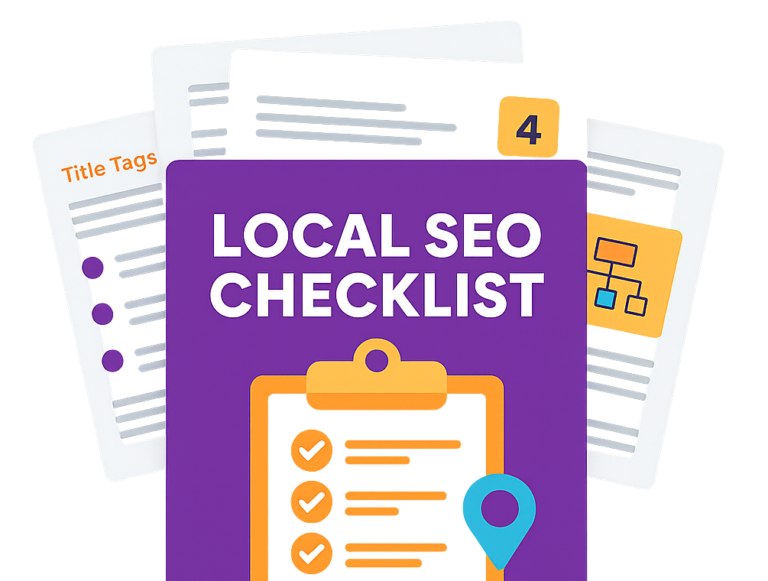When travellers start looking for a place to stay, they're not just typing "hotel" into Google anymore. They're searching for specific experiences right where they want to be. Think ‘spa break in the Cotswolds’ or ‘cheap hotel near Manchester city centre’. This is where local SEO comes in, and for hotels, it's not just another marketing buzzword—it's your direct line to guests.
Mastering local SEO means showing up in those crucial moments, getting your property right in front of the people actively looking to book. It’s about securing prime digital real estate and pulling in direct bookings, so you can stop handing over hefty commissions to the big Online Travel Agencies (OTAs).
Why Local SEO for Hotels Can't Wait
Let’s be honest, competing with the massive marketing budgets of OTAs is a tough game. But local SEO levels the playing field. A smart strategy ensures your hotel doesn't just get found, but gets chosen.
The UK hotel industry is already catching on, using local SEO as a core strategy to drive direct revenue and cut down their reliance on third-party booking sites. Hotels that get this right are seeing a huge boost in visibility for the very specific things guests are looking for. You can read more about what the UK's top hotel SEO agencies are doing to get ahead.
Here’s what a solid local SEO plan can do for you:
- Stand out in Google’s Map Pack. This is the first place many travellers look, and getting featured here is gold.
- Capture high-intent guests. You'll connect with people who aren't just browsing—they're ready to book.
- Boost your profit margins. More direct bookings mean less money paid out in OTA commissions. Simple as that.
- Showcase what makes you unique. Got dog-friendly rooms or a fantastic spa? Local SEO helps you attract the exact guests looking for those features.
Understanding How Travellers Search
Today's travellers are incredibly specific. They know what they want, and they use detailed phrases to find it. Someone might search for a 'boutique hotel in Bath' because they want a unique, charming experience, not a generic chain. Getting inside their heads and understanding these search patterns is the key to tailoring your online presence for maximum impact.
A strong local search presence can boost direct bookings by over 40%.
Getting these results isn't magic. It all comes down to three core pillars: your Google Business Profile, your website's on-site signals, and your online reputation.
First, we'll dig into how to transform your Google Business Profile from a simple listing into a powerful booking magnet.
Next, we’ll tackle how to weave local signals throughout your website, from creating dedicated landing pages to ensuring your contact details are consistent everywhere.
And finally, we'll cover reputation management, showing you how to turn guest reviews into trust signals that bring in more bookings for the long haul.
Turn Your Google Business Profile into a Booking Magnet
Your Google Business Profile (GBP) is way more than just another online directory listing. Think of it as your hotel's digital front desk and the absolute cornerstone of your local SEO strategy.
When a potential guest searches for somewhere to stay, your GBP is often the very first, and most detailed, impression they'll get of your hotel. A properly optimised profile doesn't just give them information—it actively sells the experience, turning curious searchers into direct bookings before they even need to visit your website.
Basically, it's the ultimate snapshot of what your hotel offers. A well-managed profile answers a guest's biggest questions at a glance, from your exact location and star rating to what other people thought of their stay. Neglecting it is like locking your front door right at check-in time.
Selecting the Right Categories and Services
The first real step to transforming your profile is picking the most accurate primary category. 'Hotel' is the obvious starting point for most, but getting more specific can attract a much better-qualified audience.
Are you a ‘Boutique Hotel’? An ‘Aparthotel’? Or maybe a ‘Lodge’? Choosing the primary category that truly describes your business helps Google match you with more relevant searches. After that, you can add secondary categories like ‘Wedding Venue’ or ‘Conference Centre’ if they fit what you do.
Next up, you need to detail everything you offer using the 'Services' feature. Don't just list the basics; think about what really makes your hotel stand out from the competition.
- Essential Amenities: Be crystal clear about things like ‘Free Parking’, ‘Room Service’, ‘EV Charging’, or ‘Free Wi-Fi’.
- Unique Features: This is where you highlight what sets you apart. Mention your ‘Dog-Friendly Rooms’, ‘On-site Spa’, or that amazing ‘Rooftop Bar’.
- Accessibility: Make sure you mention features like a ‘Wheelchair Accessible Entrance’ to show you welcome all guests.
Getting this granular helps you show up in those hyper-specific searches, capturing guests who know exactly what they want and are ready to book.
Crafting a Compelling Business Description
Your business description is prime real estate, and you need to treat it that way. It's your chance to tell a story that blends your brand's personality with a few strategic local keywords that both guests and search engines will love. A bland, generic description is just going to get ignored.
Instead, craft a narrative. For example, a hotel in York could write something like: "Discover our historic boutique hotel in the heart of York, just a stone's throw from the Shambles. We offer luxurious, family-friendly accommodation with complimentary breakfast, perfect for your next city break." This description naturally weaves in keywords like ‘boutique hotel York’ and ‘family-friendly accommodation’.
To help you get everything in order, here’s a quick checklist of the must-haves for a standout Google Business Profile.
Your Google Business Profile Optimisation Checklist
| Optimisation Action | Why It Matters | Pro Tip |
|---|---|---|
| Verify Your Profile | Unlocks all features and proves to Google you're a legitimate business. | Do this immediately. Verification can take a few days via postcard, so don't delay. |
| Choose Specific Categories | Helps Google match you with highly relevant customer searches. | Go beyond 'Hotel'. Use 'Boutique Hotel' or 'Aparthotel' if they fit. |
| Complete All Sections | A 100% complete profile builds trust and improves your ranking. | Fill out everything, even the sections that seem minor, like accessibility attributes. |
| Upload High-Quality Photos | Guests want to see what they're booking. Great photos increase engagement. | Add at least 10 high-resolution photos, including rooms, the exterior, and amenities. Geotag them! |
| Write a Keyword-Rich Description | This is your chance to sell your story and include important local keywords. | Write naturally. Weave in terms like "hotel near [local landmark]" or "city centre hotel". |
| Encourage & Respond to Reviews | Reviews are a huge ranking factor and provide valuable social proof. | Always reply to reviews—good and bad. It shows you care about guest feedback. |
| Use Google Posts Regularly | Keeps your profile fresh and signals to Google that you're an active business. | Share last-minute deals, promote local events, or highlight a new menu item. |
Following this checklist will put you miles ahead of competitors who just "set and forget" their profiles.
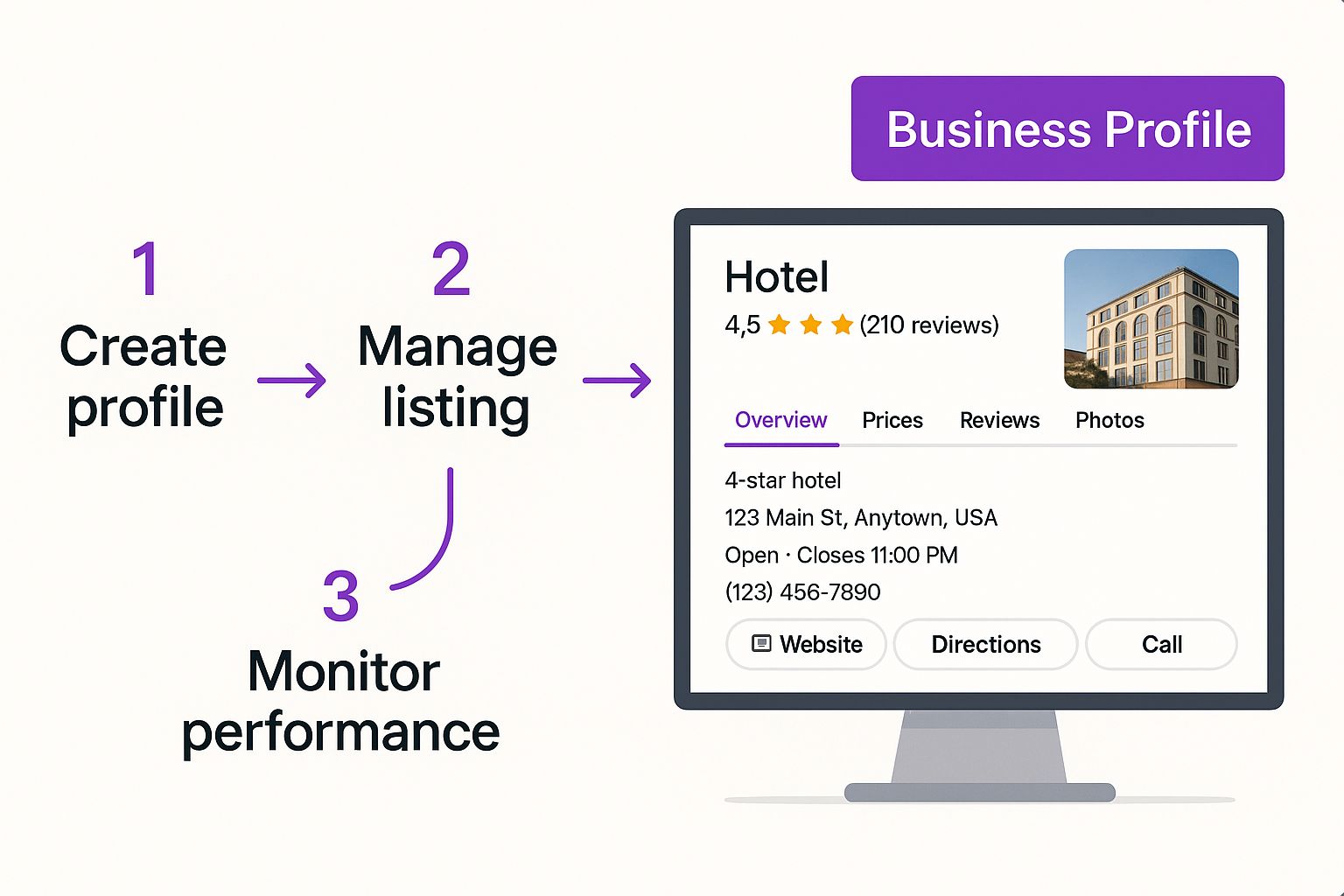
As you can see, a well-optimised profile layout clearly presents all the crucial information—reviews, photos, contact details—making it incredibly easy for a guest to decide to book with you.
Leveraging Advanced GBP Features
If you really want to turn your profile into a booking machine, you need to use its dynamic features consistently. Google loves to see activity and rewards active profiles with better visibility.
For hotels, profiles with keyword-rich descriptions see a 31% improvement in local pack visibility. What's more, hotels that regularly update their GBP posts appear 2.8 times more frequently in the top 3 map results.
Google Posts are perfect for sharing last-minute deals, promoting seasonal packages, or just highlighting cool events happening nearby. Every single post is a fresh signal to Google that your business is active and relevant right now.
The same goes for photos. Regularly uploading high-quality, geotagged photos of your rooms, lobby, and amenities helps guests visualise their stay and tells Google exactly where you are. For a deeper dive into making your profile stand out, explore our complete guide to Google My Business optimisation.
Optimising Your Website for Local Searches
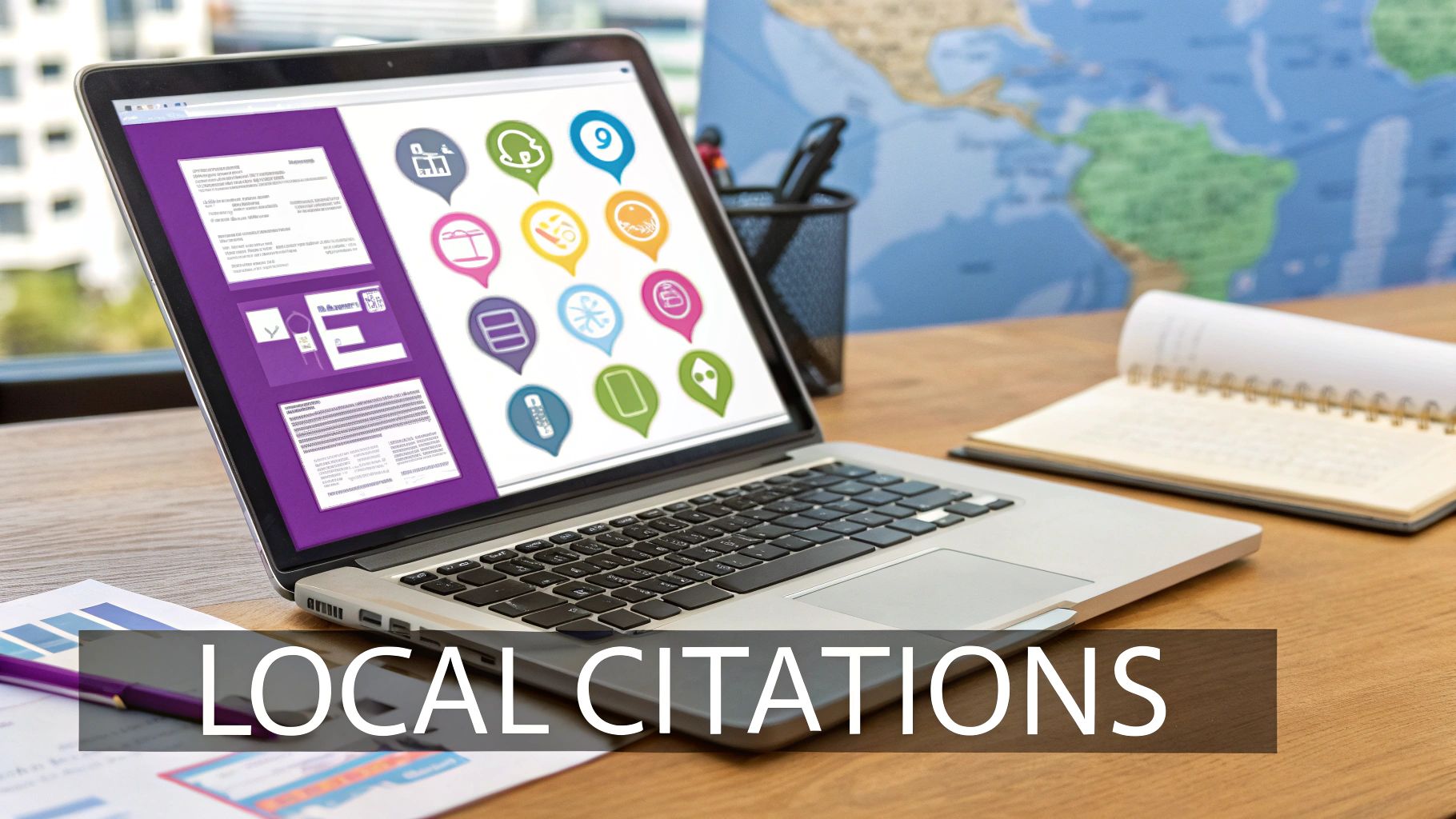
While your Google Business Profile gets you noticed, your website is where guests actually click "book". Getting your local SEO for hotels right means weaving powerful local signals directly into your site’s DNA. This goes way beyond just listing your city on the homepage.
Proper on-page optimisation is about creating a seamless experience that answers local questions for both search engines and potential guests. The goal is to make it crystal clear to Google who you are, where you are, and what you offer visitors. Nail this, and you’ll see your hotel climb the rankings in local search results.
Create Highly Targeted Local Landing Pages
Think for a moment about why guests are coming to your town. Is it for a wedding at a nearby estate? A major business conference? Or maybe just to explore the local heritage sites? Creating dedicated landing pages that speak directly to these needs is an absolute game-changer.
Instead of a single, generic 'Facilities' page, build out specific pages that target these long-tail keywords. This tactic helps you pull in highly qualified traffic from people who are much, much closer to making a decision.
For example, you could create pages like:
- 'Wedding Venue in the Cotswolds': Detail your packages, show off photos from past weddings, and sprinkle in some glowing testimonials.
- 'Business Conference Rooms in Central Manchester': Highlight your A/V facilities, delegate rates, and how close you are to key transport links.
- 'Dog-Friendly Stays Near the Lake District': Clearly explain your pet policy, mention a few brilliant nearby walking routes, and feature pictures of happy four-legged guests.
Each page needs to be packed with relevant content, great images, and an unmissable call-to-action to get in touch or book. It's a focused approach that tells Google you’re the go-to authority for that specific service in your location.
Master Your NAP and Schema Markup
Consistency is king in local SEO. Your hotel’s Name, Address, and Phone number (NAP) needs to be perfectly identical on every single page of your website. Don’t just tuck it away on the contact page—stick it in the footer so it's always visible. This constant reinforcement is a massive trust signal for search engines.
To paint an even clearer picture for Google, you need to implement schema markup. Think of it as a special code that translates your website's content into a language search engines can instantly understand. For hotels, this is incredibly powerful.
By using Hotel schema, you can spoon-feed Google important details like your star rating, price range, amenities, and guest reviews directly within the search results, making your listing far more compelling.
I know, implementing code sounds a bit technical, but it's a non-negotiable step in modern local SEO. If you're new to the concept, it's worth taking a moment to understand what Schema Markup is and how it works to give your hotel a serious competitive edge.
This structured data is what creates those eye-catching "rich snippets" in search results, which can dramatically improve your click-through rate. By making your hotel’s information easy for Google to digest, you are directly helping yourself get seen.
Building a Reputation That Drives Bookings
Trust is the currency of the hospitality world. Online, that trust is built through a combination of guest reviews and consistent, verifiable business information. More often than not, a potential guest’s decision to book with you hinges on what others have said about their stay and how easily they can confirm your hotel's details.
Getting a handle on your online reputation isn't just a nice-to-have; it's a fundamental part of any serious local SEO for hotels strategy.
It all starts with something called citations. Think of these as digital breadcrumbs. They are simply mentions of your hotel's Name, Address, and Phone number (NAP) scattered across the web. Each mention acts as a signpost pointing back to you, reinforcing to Google that your hotel is a legitimate, established business at a specific physical location.
Securing High-Value Local Citations
Not all citations carry the same weight. Getting your hotel listed on a bunch of random, low-quality directories won't move the needle much. The real magic happens when you secure listings on high-value travel directories and authoritative local business websites that Google already knows and trusts.
The absolute key here is consistency. Your NAP details must be identical everywhere. Even a tiny variation, like using "St." on one site and "Street" on another, can create confusion for search engines and water down the impact of your efforts.
To get the best results, prioritise these types of directories:
- Major Travel Platforms: Make sure your listings on sites like TripAdvisor, Booking.com, and Expedia are complete, accurate, and fully optimised. These are the big players.
- Local Business Directories: Get listed with your local Chamber of Commerce, city tourism board, and any other regional business hubs. These ground your hotel in the local community.
- Niche Travel Blogs: A mention from a popular UK travel blogger can be a powerful signal to both Google and your target audience.
The Art of Reputation Management
Once your citations are in good shape, your focus should shift to managing your reputation. This means actively encouraging guest reviews and, just as importantly, responding to every single one of them. Reviews are a direct line to your guests, offering the kind of social proof that gives future bookers the confidence they need.
You can't just sit back and hope for feedback. A proactive approach is essential. A simple, polite follow-up email after a guest's stay, with a direct link to your Google review page, can make a world of difference. The goal is to make leaving a review as easy as possible.
When it comes to local search, performance has a direct impact on a hotel's bottom line. Google's local pack sits right at the top of the search results, and research shows that a massive 42% of users click on these listings. What's more, 90% of marketers report that reviews directly influence ranking, proving that customer feedback serves as both a powerful trust signal and a crucial algorithmic ranking factor.
A thoughtful, well-crafted response to a negative review can sometimes win over more future guests than a dozen glowing five-star ones. It shows you listen, you care, and you’re committed to making things right. Always be professional, empathetic, and offer a real solution where you can.
This constant feedback loop is a core part of how online reputation management impacts SEO, as it signals to both customers and search engines that you are an engaged, trustworthy, and reliable business.
How to Track Your Local SEO Performance
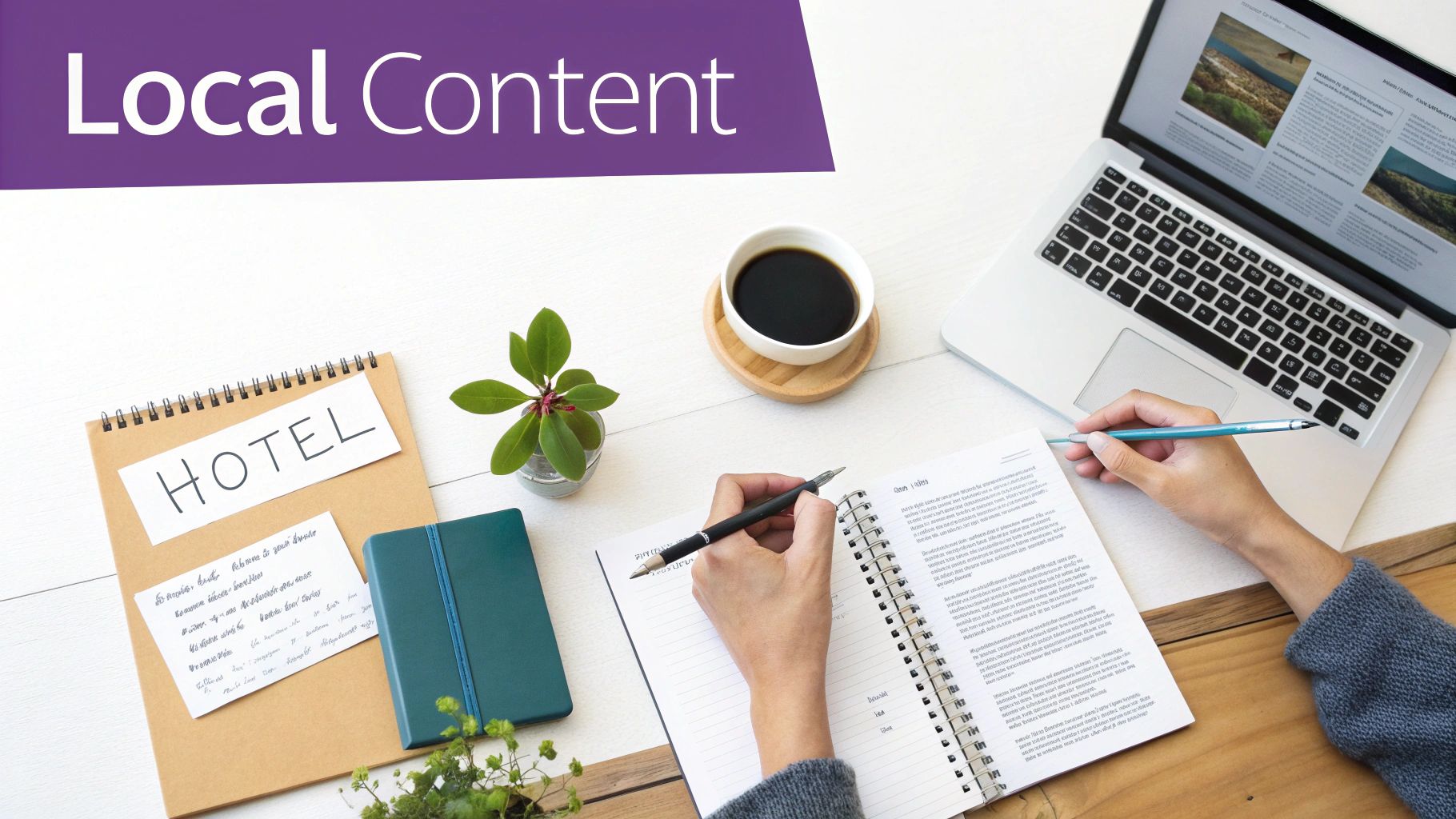
A great strategy is only as good as its results. Without tracking your performance, you're essentially flying blind, unable to see what’s working and where you need to adjust your efforts.
The good news is that you don’t need an expensive suite of tools to get started. Free platforms from Google offer a wealth of information. This isn't about getting lost in complex spreadsheets; it's about setting up a simple, repeatable check-in process to keep your local SEO for hotels sharp and your direct bookings climbing.
Key Metrics to Monitor in Google Business Profile Insights
Your Google Business Profile (GBP) is a goldmine of actionable data. The 'Performance' section tells you exactly how potential guests are interacting with your listing directly in search and maps. It’s the most direct measure of your local visibility.
When you log in, focus on these core metrics:
- How customers searched for your business: This chart breaks down whether people found you by searching your hotel's name (Direct) or by searching for a category, like "hotel in Cambridge" (Discovery). A high number of discovery searches is a fantastic sign your optimisation is working.
- Queries used to find your business: See the exact search terms people used to trigger your listing. This is great for understanding guest intent and can reveal new keyword opportunities for your website content.
- Website clicks: The number of people who clicked from your GBP listing through to your website. This is a crucial first step in the direct booking journey.
- Directions requests: A strong indicator of booking intent. Someone asking for directions is very likely planning a visit.
- Calls: This shows how many people clicked the "call" button on your profile—a direct lead straight to your front desk.
Tracking these figures month-on-month gives you a clear picture of your profile's health and its impact on your bottom line.
Using Search Console and Analytics for Deeper Insights
While GBP Insights focuses on your listing, Google Search Console and Google Analytics tell you what happens once a user lands on your website. They work together to complete the picture.
Google Search Console is your window into how Google sees your site. It highlights which local keywords are driving clicks and impressions, allowing you to see your ranking position for terms like ‘boutique hotel bath’ and identify which of your locally-focused pages are performing best.
Meanwhile, Google Analytics shows you what visitors do once they arrive. You can track how many bookings originate from organic search traffic and which pages are most popular with local searchers. By setting up conversion goals, you can directly attribute revenue to your SEO efforts, proving its value.
Creating a straightforward monthly check-in is the best way to stay on top of this data without feeling overwhelmed. If you need a hand organising your findings, our guide to creating a monthly SEO report template provides a great starting point for structuring your analysis and keeping your strategy on track.
Frequently Asked Questions
Diving into a new digital marketing strategy always throws up a few questions. Let's tackle some of the most common queries I hear from hoteliers when they start getting serious about a local SEO plan.
How Long Does Local SEO Take to Show Results for a Hotel?
Patience is a virtue here, but you won't be waiting forever. While it's definitely not an overnight fix, you can typically expect to see real, meaningful improvements in your hotel's visibility and website traffic within three to six months of consistent effort.
Of course, a few things can change that timeline. The competitiveness of your location plays a huge part; a hotel in central London is in for a tougher fight than one in a sleepy coastal town. Your starting point matters, too. If your online presence is a bit neglected, it'll take a little longer.
But there are ways to nudge things along. Consistently getting new guest reviews and regularly updating your Google Business Profile with fresh photos and posts are powerful signals to Google that can help speed up your progress.
Should My Hotel Pay for a Local Citation Building Service?
For a busy hotelier, this can be a very smart move. Honestly, building citations manually is a painstaking, time-consuming task. A reputable service ensures your hotel's name, address, and phone number (NAP) are listed correctly and consistently across dozens of important online directories.
The key is to choose a service that values quality over sheer quantity. One good listing on a respected local travel guide or tourism board website is worth far more than dozens of listings on random, low-quality directories.
Think of it as outsourcing a necessary but repetitive chore. It frees you up to focus on what you do best—looking after your guests—while a critical piece of your local SEO for hotels is handled correctly and efficiently.
Which Is More Important for Driving Bookings: Local SEO or Social Media?
This is a classic question, but they aren't really competing—they're a team. They just play different positions. Local SEO is absolutely essential for grabbing guests who have high booking intent. These are the people actively searching for a hotel in your area right now.
Social media, on the other hand, is brilliant for building your brand's personality, telling your story, and keeping in touch with past and potential guests. It’s more about the long game: building relationships and staying top-of-mind.
So, when it comes to driving direct, immediate bookings from people ready to pull out their credit cards, a rock-solid local SEO foundation is non-negotiable. It puts you in front of customers at the exact moment they’re looking to spend.
Ready to turn local searches into direct bookings? Bare Digital offers specialised SEO services that get your hotel seen by the right guests. Get your free SEO Health Check and a tailored Activity Plan to see exactly how we can boost your rankings and revenue. Start your journey to better visibility today.


